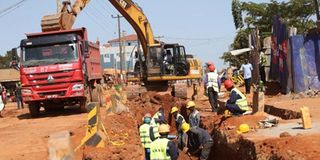Who is to blame for dusty city streets?

Ongoing construction works along Bakuli—Nakulabye road.
What you need to know:
- Health risks. The falling debris and dust from the same building has also become unbearable for both taxi operators and their passengers, putting their lives at a health risk.
- Blame. KCCA blames the flooding on increased human activities such as illegal encroachment on wetlands and blocked drainage channels.
Kampala. When Kampala city streets are not flooding, they are dusty. City traders, motorists and pedestrians are facing a rough time having to manoeuvre through the dusty and congested streets.
The dust is partly caused by the ongoing construction works, dug out trenches, excavation sites and roads that are not tarmacked in some parts of the city.
While most streets are clear of vendors, who were previously selling their merchandise and littering the city, dust pollution is the new menace. It is worse during the dry season.
The works being undertaken within the city include the installation of sewer lines on John Ssebaana Kizito Road (former Nakivubo Road) by National Water and Sewerage Corporation (NWSC) and the erection of a high-rise building along Luwum Street.
Disrupt business
Some of the traders and motorists who spoke to Daily Monitor yesterday accused Kampala Capital City Authority (KCCA) of failing to contain the dust and congestion, which they claim has paralysed their work. Pedestrians are not spared either.
“Ever since they started installing the pipes, all my merchandise has been covered in dust. This is because as you can see, am just inches away from the installation site. Whenever it rains, the situation becomes worse as the whole of this ground floor becomes muddy. Of course not forgetting pedestrians who disrupt us a lot since the road is now narrow,” Ms Stella Nakidde, a trader at Ssekaziga Building on Ssebana Kizito Road, said.
Alternative measures
She accused KCCA of failing to have alternative measures to prevent the current outcry which she said has left majority of them in losses.
The situation on Luwum Street is worse as taxi operators scramble to exit the old taxi park following the erection of a new building on the same street whose construction materials have eaten up part of the road.
The falling debris and dust from the same building has also become unbearable for both taxi operators and their passengers, putting their lives at a health risk.
Residents are exposed to dust-related illnesses like asthma, heart diseases, cancer and chronic bronchitis among others.
Warning
Mr Ronald Ssekamate, a taxi driver, warned that the current situation on Luwum Street could result in accidents, saying there is no official controlling the flow of traffic.
“Luwum street is totally messed up. This situation is putting our lives at a risk because drivers have now started fighting for who must pass first. For instance, you load passengers at 4pm but you spend one hour or more on Luwum Street figuring out where to pass as taxis get stuck there,” he said.
Mr Peter Kaujju, the KCCA spokesperson, acknowledged the ongoing construction works in the city.
However, he noted that all construction works in the city have to be sealed off to protect people from dust and the falling debris.
“Whoever has not sealed off the construction site is breaking the law. Once we get them, they will be answerable,” he said.
He didn’t explain what KCCA is doing to solve the traders’ and motorists’ concerns.
Replacing sewer pipes
Daily Monitor understands that NWSC is currently replacing the old sewer lines with new ones in the city.
For instance, they have just finished installing sewer lines at Centenary Park, but these installations are likely to affect a few individuals in some places.
Whenever it rains, parts of Kampala city and its neighborhood are left flooded.
Pedestrians and motorists struggle to make their way through the roads.
KCCA blames the flooding on increased human activities such as illegal encroachment on wetlands and blocked drainage channels.




